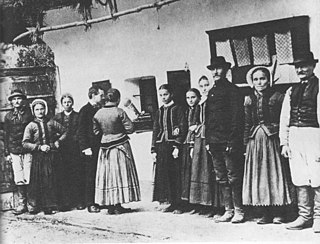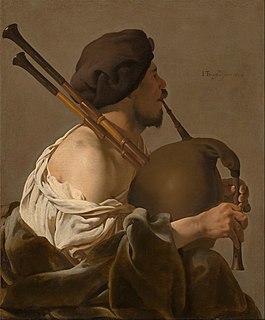
The uilleann pipes are the characteristic national bagpipe of Ireland. Earlier known in English as "union pipes", their current name is a partial translation of the Irish-language term píobaí uilleann, from their method of inflation. There is no historical record of the name or use of the term uilleann pipes before the twentieth century. It was an invention of Grattan Flood and the name stuck. People mistook the term 'union' to refer to the 1800 Act of Union; this is incorrect as Breandán Breathnach points out that a poem published in 1796 uses the term 'union'.
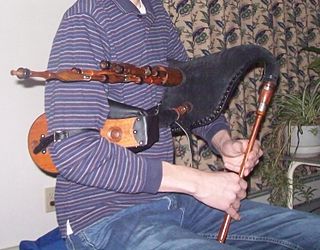
The Scottish smallpipe, in its modern form, is a bellows-blown bagpipe re-developed by Colin Ross and many others. There are many surviving bellows blown examples of similar historical instruments as well as the mouth-blown Montgomery smallpipes in E, dated 1757, which are now in the National Museum of Scotland. There is some discussion of the historical Scottish smallpipes in Collinson's history of the bagpipes. But more reliable research and information can be obtained in Hugh Cheape's "Bagpipes: A National Collection." Some instruments are being built as direct copies of historical examples, but few modern instruments are directly modelled from older examples; the modern instrument is typically larger and lower pitched. The innovations leading to the modern instrument, in particular the design of the reeds, were largely taken from the Northumbrian smallpipes.

The border pipes are a type of bagpipe related to the Scottish Great Highland Bagpipe. It is perhaps confusable with the Scottish smallpipe, although it is a quite different and much older instrument. Although most modern Border pipes are closely modelled on similar historic instruments, the modern Scottish smallpipes are a modern reinvention, inspired by historic instruments but largely based on Northumbrian smallpipes in their construction.

The Northumbrian smallpipes are bellows-blown bagpipes from North East England, particularly Northumberland and Tyne and Wear. In a survey of the bagpipes in the Pitt Rivers Museum, Oxford University, the organologist Anthony Baines wrote: "It is perhaps the most civilized of the bagpipes, making no attempt to go farther than the traditional bagpipe music of melody over drone, but refining this music to the last degree."
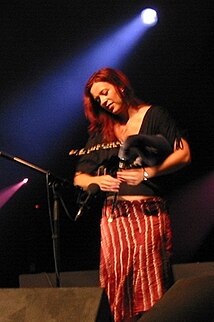
Kathryn Tickell, OBE, DL is an English player of the Northumbrian smallpipes and fiddle.
Here Northumbria is taken to mean Northumberland, the northernmost county of England, and County Durham, as is defined by the Oxford English Dictionary. This area, together with Tweeddale, was the ancient British tribal kingdom of Bernicia (Bryneich) and is notable for the stable ancestry of its present indigenous population, which has been identified by DNA analysis to be an offshoot of the group Scotland, Cumbria and the North of Ireland, but not so closely related to the other peoples of the UK. The area was the core of the outstanding artistic culture that developed during the Northumbrian Golden Age of the 7th and 8th centuries; it would be unwise to suggest that the area did not have a flourishing musical culture at that time, or that it was not of similar sophistication - Bede makes reference to the playing of the harp.
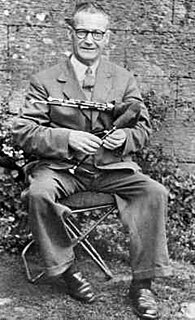
Billy Pigg (1902–1968) was an English player of Northumbrian smallpipes. He was a Vice-President and an influential member of the Northumbrian Pipers Society from 1930 until his death.
The Northumbrian Pipers' Society was founded to promote both types of Northumbrian bagpipes – the Northumbrian smallpipes and the half-long pipes, now generally known as the Border pipes. There had been several attempts to encourage the pipes and their music during the 19th century, but no society was formed with this specific aim until the Northumbrian Small Pipes Society in 1893. That society organised a series of competitions, in which Richard Mowat and Henry Clough were both prizewinners. However it was short-lived, dissolving around 1899. Today the society is divided into two branches, the main branch based in Morpeth, and the Cleveland branch based in Sedgefield.

Fred Morrison is a Scottish musician and composer. He is carried on by his daughter Eliane and son Seonaidh. He has performed professionally on the Great Highland Bagpipes, Scottish smallpipes, Border pipes, low whistle, Northumbrian Smallpipes and uilleann pipes.
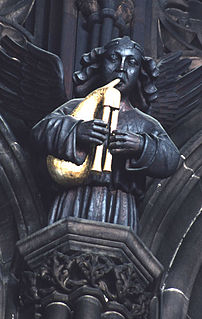
The English bagpipes are bagpipes played in England. Of these, the only continuous tradition is that of the Northumbrian smallpipes, which are used in North East England, particularly Northumberland and Tyne and Wear.
Jack Armstrong (1904–1978) was an authoritative and influential performer on the Northumbrian smallpipes.
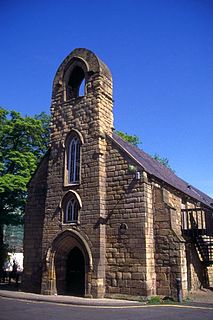
The Morpeth Chantry Bagpipe Museum is located in Morpeth Chantry, Morpeth, Northumberland, England.
Colin Ross is an English folk musician who plays fiddle and Northumbrian smallpipes; he is a noted maker of Northumbrian smallpipes, Border pipes and Scottish smallpipes, and one of the inventors of the modern Scottish smallpipes. Ross played both Northumbrian smallpipes and fiddle in the English folk music band the High Level Ranters which was formed in 1964 and specialised in the music of Northumberland and the Scottish Borders, playing a major role in the revival of Northumbrian music from the 1960s. In 1977, each of the Ranters was given the chance to produce a solo album; rather than do this alone, Ross collaborated with various other musicians to produce Cut and Dry Dolly, an album of early Northumbrian music, simple dance tunes from the late 18th century William Vickers manuscript together with long variation sets, particularly from the Peacock tunebook from the beginning of the 19th century. This was very influential in reviving interest in this early strand of Northumbrian music.
Joe Hutton (1923–1995) was born in Halton Lea Gate, near Haltwhistle in the west of Northumberland. Like his father, Jake, he was a shepherd, and a musician - he started on the fiddle, but took up the Northumbrian smallpipes after hearing P.J. Liddell and G.G. Armstrong playing at a concert in 1936. He started on a James Reid set from Halton Lea Gate, refurbished by G.G. Armstrong, a noted piper from Hexham, and he took lessons in the instrument from Armstrong. He made rapid progress, and won a competition as a novice, the following year. Armstrong made him a new set of pipes in January 1938, and Joe was photographed, standing at the left, with other competitors at the Bellingham Show piping competition in 1938. He continued to play the fiddle at dances during the war years, but he continued piping, upgrading to a 17-keyed chanter, again by Armstrong, in 1943. In 1950 he began piping in competitions again, winning all the Open competitions for two years. He was very isolated living out on the border with Cumberland, and to play with Tommy Breckons, a noted piper from Bellingham, he recalled "it meant walking 8 miles to Gilsland, bus to Hexham, another bus to Bellingham....Man, it was a day's work getting there". On another such piping trip, to Carrawbrough on the Roman Wall, he met his future wife, Hannah, whose brother John was also a piper.

Jim F. Bryan (1931–2009) was a noted player and maker of the Northumbrian smallpipes. His interest in the pipes began in 1950, and he acquired a set of pipes a few years after that. His widow Marion recalled
William Alfred Cocks (1892-1971) was a master clock maker from Ryton, near Newcastle upon Tyne. He had a lifelong interest in the history and culture of the North-east of England, and particularly in the Northumbrian smallpipes and half-long pipes. He assembled a large collection of historic bagpipes, their music, and related materials, which forms the core of the collection now housed at the Morpeth Chantry Bagpipe Museum. He was elected to the Society of Antiquaries of Newcastle upon Tyne in 1920, remaining a member until his death. In 1928, he was one of the earliest members of the Northumbrian Pipers' Society, being elected one of the technical advisers, with responsibility for smallpipes. He became a Vice-President of the Society in 1938. When an exhibition of historic pipes was held in the Black Gate Museum in 1961, most of the exhibits were from Cocks's collection.
John Forster Charlton (1915–89), was an English traditional musician, originally from near Hexham, Northumberland, who later settled in Gateshead. He at first played fiddle, but later also took up the Northumbrian smallpipes. He was a major figure in the folk music revival during the 1950s and 1960s, and an active member of the Northumbrian Pipers' Society. He was a founder member of the High Level Ranters, playing fiddle and smallpipes on their first record, Northumberland for Ever, but he subsequently left the group. Later he played in a country dance band, The Borderers.
